Vitra’s Nelson bench is a design classic from the 1940s developed by George Nelson, whose background in architecture is visible in the clean, functional design of the bench. The airy charm of the Nelson bench comes from slim pieces of ash wood with blank spaces between them. The pieces are held together with strong finger joints and supported by two black, angular legs. Besides a seat, the Nelson bench can also be used as a side table.
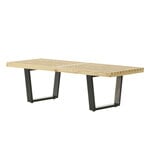
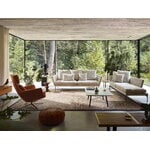

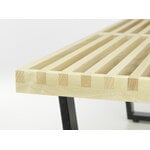
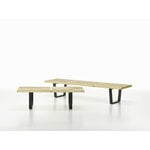
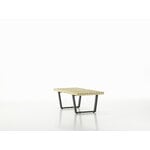
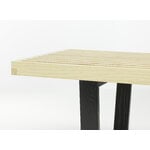
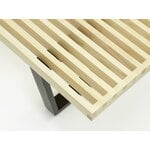
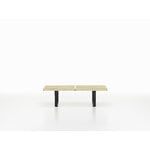
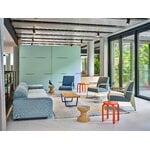
Nelson bench, short, ash
Vitra
Description
Vitra’s Nelson bench is a design classic from the 1940s developed by George Nelson, whose background in architecture is visible in the clean, functional design of the bench. The airy charm of the Nelson bench comes from slim pieces of ash wood with blank spaces between them. The pieces are held together with strong finger joints and supported by two black, angular legs. Besides a seat, the Nelson bench can also be used as a side table.
Product details (7)
- Colour
- Ash, black
- Width
- 122 cm
- Depth
- 46.9 cm
- Height
- 35.3 cm
- Material
- Ash
- Seat material
- Ash
- Base material
- Lacquered ash
- Product ID
Designer
George Nelson (1908–1986) was an American architect and designer who is considered as one of the greatest American designers of the mid-twentieth century. Nelson studied at Yale University and in Rome, where he became familiar with European architecture and design. After returning to the United States, Nelson started working at Herman Miller, where he quickly took the position of Design Director.
During his long career, Nelson designed numerous well-known pieces of furniture, lighting and interiors. Besides a designer, he was also a popular lecturer, photographer and essay writer. Nelson worked for Herman Miller until 1972, and together with designers such as Charles and Ray Eames, Isamu Noguchi and Alexander Girard, he created the foundation for Vitra's iconic collections.
Some of his most famous designs include the minimalistic Nelson Bench from 1946, the playful Marshmellow Sofa from 1956 and the Ball Clock, Sunflower Clock and Eye Clock from the Wall Clocks collection from 1948–1960.
View all productsReviews (2)
5
Based on 2 reviews
-
A
anonyymi
Helsinki, Finland
Hieno
404 days ago
-
A
Anonym
Hamburg, Germany
Super verpackt, immer informiert über den aktuellen Stand der Bestellung. Und das Produkt ist wie gewohnt von Vitra / Artek in einwandfreier Qualität.
335 days ago
Sustainability
The Product Sustainability Framework, our criteria of sustainable design, helps you find the most sustainable products in our selection. Read below which sustainability criteria this product has met.
Working conditions & labour 7/9
-
Equal opportunities for all employees
-
Commitment to UN Global Compact, fair compensation for all employees
-
Corporate responsibility requirements defined and communicated for suppliers
-
Systematic work for improved inclusion and well-being in the workplace
-
Transparent supply chain
-
Suppliers' compliance to a code of conduct ensured
-
Compliance to the UN Guiding Principles on Business and Human Rights ensured in the supply chain
-
Direct suppliers audited and certified
-
Support for community involvement in the supply chain
Eco-friendly production 7/9
-
Fair and resource-wise water-use in production
-
No incineration or landfilling of returned items
-
No use of endangered species as materials
-
No direct environmental emissions or waste (excl. GHGs) from production
-
Production and material sourcing that respect biodiversity, animal rights, and natural ecosystems
-
Material-efficient and ecological packaging
-
No potentially harmful chemicals used in own production
-
The sustainability of direct suppliers' production is addressed and monitored
-
Positive impact on nature’s well-being through operations that regenerate natural ecosystems
Climate impact 5/8
-
Company's direct greenhouse gas emissions identified and commitment to reduction
-
Product's carbon impact identified and commitment to reduction
-
Guidance on energy- and eco-efficient use of the product
-
Contribution to climate initiatives beyond the brand’s direct operations
-
100 % renewable energy in own production and operations
-
Low-carbon or compensated transportation
-
Carbon footprint of the product calculated and goals set to reduce it
-
Carbon neutral or carbon negative product
Sustainable materials 5/6
-
Sustainable and long-lasting material choices
-
No harmful or hazardous substances
-
Responsible raw material sourcing and production
-
Materials suited for circularity: monomaterials, recyclable finishings, renewable or recycled contents etc.
-
Ecological materials: natural, biodegradable, recyclable or recycled contents
-
Outstanding materials in terms of innovativeness, responsibility, sustainability and circularity: local production or sourcing, 100 % recycled content, C2C-certification etc.
Circular design 5/5
-
High aesthetic quality promoting long-term use of the product
-
Technically durable product design and material choices
-
Design for enduring life-long quality
-
Design and support for product maintenance, repair and upgradability
-
Innovative circular design solutions: circular service system, resale platform, remanufacturing, collection of used products, etc.












